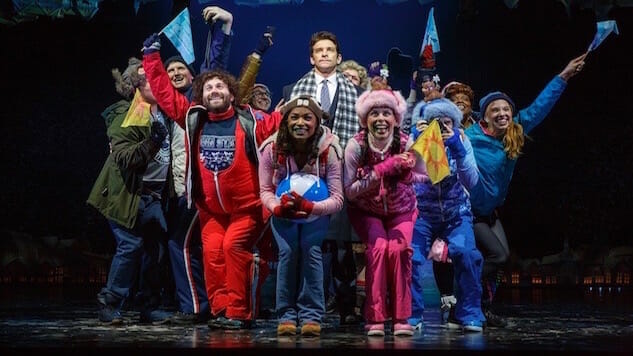Danny Rubin Turns the Screenplay for Groundhog Day into a Musical Hit
Joan Marcus
Ever feel trapped in some kind of time warp where every day feels repetitive? Welcome to Danny Rubin’s world. Rubin collaborated with director Harold Ramis on the original 1993 script for the cult classic film Groundhog Day, starring Bill Murray and Andie MacDowell.
And Rubin has turned that script into the book of the musical version of Groundhog Day, that stars Andy Karl. It opened at the August Wilson Theatre on Broadway on April 17, 2017 after an initial run at the Old Vic Theatre in London. On May 2, Rubin was nominated for a Tony Award for best book, and Groundhog Day as best musical.
The musical focuses on weatherman Phil Connors (played expertly by Andy Karl) who is stuck in the hamlet of Punxsutawney, Pa, where a Groundhog Day ceremony takes place for the media. The day repeats itself, and Connors can’t free himself from the everydayness of a series of recurring events: an alarm waking him up, meeting local residents trapped in the same conversations and wooing his colleague Rita Hanson (Barrett Doss).
Ben Brantley noted in his New York Times review that Groundhog Day on Broadway “re-imagines a much-loved film about instant karma with such fertile and feverish theatrical imagination that you expect it to implode before your eyes. It is Phil’s journey more than his destination that makes ‘Groundhog Day’ such a joy on the road to self-discovery.”
Rubin, who is 60-years-old and resides in Sante Fe, N.M., started out as a biology major at Brown University, before graduating from Northwestern University with a degree in film, television and film. Here’s what Rubin said about what sparked the original script and making the transition to the Broadway stage.
Paste: You and Harold Ramis collaborated on the original film. What sparked the idea?
Rubin: I wrote it as an original screenplay. It was a year after I finished it that it landed on Harold’s desk. I was thinking about immortality. If a person could live long enough, maybe they could grow up. For some people, one life doesn’t seem to be enough. It felt to me like a worthy story experiment, but a cumbersome one to make a movie of it. I realized I could get immortality by having the same day repeated.
-

-

-

-

-

-

-

-

-

-

-

-

-

-

-

-

-

-

-

-

-

-

-

-

-

-

-

-

-

-

-

-

-

-

-

-

-

-

-

-








































